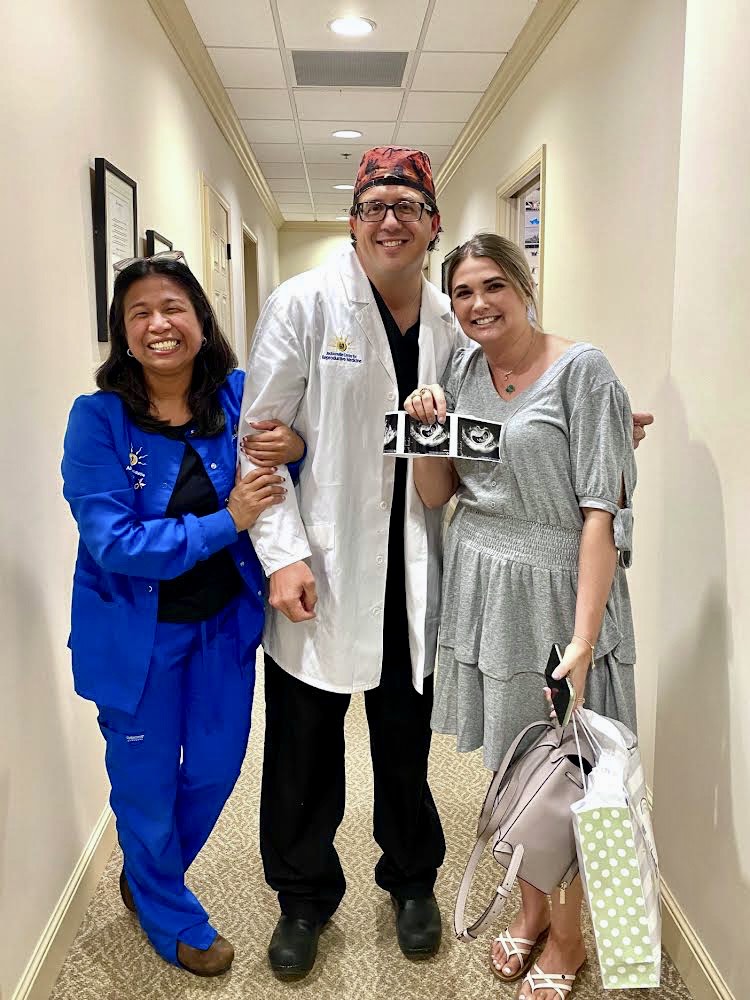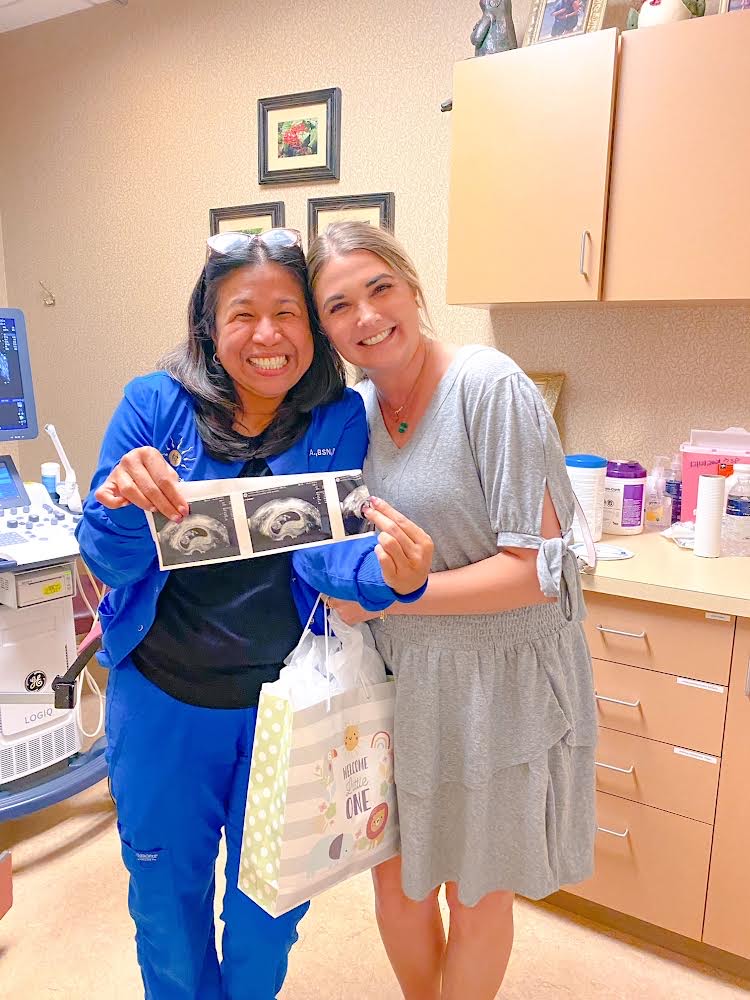- What is infertility?
- What causes infertility?
- How can a reproductive medicine doctor help your infertility?
- How do you know it’s time to call a reproductive medicine specialist?
 Each year, more than six million American women, or 10% of the population struggle to get or stay pregnant. One-third will turn to a reproductive medicine specialist, more commonly called a fertility doctor.
Each year, more than six million American women, or 10% of the population struggle to get or stay pregnant. One-third will turn to a reproductive medicine specialist, more commonly called a fertility doctor.
After some trial, error, and frustration, one of our patients turned to Christopher W. Lipari, M.D., board certified in obstetrics and gynecology at Advanced Reproductive Specialists Jacksonville Center for Reproductive Medicine. The patient, who for privacy reasons asked to remain anonymous in this blog, says, “I had three fertility doctors before I found Dr. Lipari…and almost five full years of going through infertility.” By March 2022, she was pregnant.
What’s it like to work closely with a reproductive specialist like Dr. Lipari? What are some of the innovative tools that fertility doctors use to treat patients? We have answers as seen through the eyes of a patient at Advanced Reproductive Specialists Jacksonville Center for Reproductive Medicine.
What Is Infertility?
The official definition of infertility is “not being able to get pregnant after one year of trying (or six months if a woman is 35 or older). If you get pregnant but are unable to carry to term, you may also be infertile.
Pregnancy is a complex, delicate process that includes:
- The woman must be able to ovulate, or release an egg from her ovary
- The egg then travels through the fallopian tube to the uterus, or womb
- The man must be able to produce viable sperm that meet the egg in the womb
- Finally, the fertilized egg must attach itself to the inside lining of the womb
Infertility can happen at any point in this process. Infertility isn’t just the “woman’s problem,” either. About one-third of infertility cases are caused by a problem with the man’s reproductive processes. One-third are pinpointed to a problem with the woman’s health and reproductive processes. The remaining one-third are either unknown or a mixture of male and female issues.
What Causes Infertility?
 There are unique causes of infertility associated with female and male reproduction. For example, women are most often infertile due to:
There are unique causes of infertility associated with female and male reproduction. For example, women are most often infertile due to:
- Blocked fallopian tubes caused by ectopic pregnancy, endometriosis, pelvic inflammatory disease, or other issues
- Polycystic ovarian syndrome (PCOS), a hormone imbalance that causes the ovaries to stop working prematurely
- Uterine fibroids
Men are most commonly infertile due to problems with sperm production:
- Too few or no sperm
- The shape of the sperm block it from reaching the egg
- Varicocele, which is when the veins on the man’s testicles are too large
Some men are born with these issues, but they can also develop later in life.
When the patient in our story above first visited Dr. Lipari, together they discovered that she suffered from a common infertility problem. Our success-story patient says, “Dr. Lipari was the first doctor that really felt confident that I had endometriosis.”What are the types of treatments you can expect from your reproductive medicine physician?
How Can a Reproductive Medicine Doctor Help Your Infertility?
 A fertility doctor has a host of treatments available, from artificial insemination, assisted reproductive technology, medications, and surgeries. Many times, these treatments combine to produce the desired result.
A fertility doctor has a host of treatments available, from artificial insemination, assisted reproductive technology, medications, and surgeries. Many times, these treatments combine to produce the desired result.
There is no routine infertility case; each patient receives individualized care based on their unique set of factors affecting their reproductive health. To break this down further, let’s define the treatments that patients like the mom-to-be above to a successful pregnancy.
- Excision surgery is used to treat endometriosis. Endometriosis is a disease where the tissue that normally grows inside the uterus spreads to other parts of the body, and excision surgery is a delicate operation to remove these tissue growths
- IUI is a type of assisted reproductive technology that places sperm directly into the uterus for egg fertilization
- IVF is another assisted reproductive technology that takes mature eggs from the woman and fertilizes them in a lab manually, then transplants the fertilized egg to the uterus
These, and other treatments are exactly why women and men visit a reproductive medicine specialist like the team at Advanced Reproductive Specialists Jacksonville Center for Reproductive Medicine.
While talking about reproductive health may feel embarrassing, the patient in our story felt right at ease immediately. She says, “As soon as I was in his care I felt at ease. I felt very comfortable that he knew exactly what to do and when. My nurse Imelda was also so helpful and sweet. She answered any questions I had, day or night, for the past year.”
How Do You Know It’s Time to Call a Reproductive Medicine Specialist?
 If you are under age 35 and have been trying to get pregnant for months, first, see your gynecologist or primary care provider for a general check-up. You may have health issues affecting your ability to get pregnant. For example, your primary care doctor may diagnose common medical issues such as illnesses of the thyroid or even diabetes that you can get under control. If these measures don’t help, it’s time to consider a fertility specialist.
If you are under age 35 and have been trying to get pregnant for months, first, see your gynecologist or primary care provider for a general check-up. You may have health issues affecting your ability to get pregnant. For example, your primary care doctor may diagnose common medical issues such as illnesses of the thyroid or even diabetes that you can get under control. If these measures don’t help, it’s time to consider a fertility specialist.
With that said, if you are current with your gynecological and medical visits and have been trying to become pregnant, it may be time to call a reproductive medicine specialist. This is especially true for women with irregular periods or diagnosed endometriosis or fibroids. Help is available for all of these conditions.
Millions of people every year in the U.S. dream about getting pregnant but fail to achieve their goals. Reproductive medicine provides these families with a little extra help. These technologies are improving rapidly, increasing the chances of pregnancy for women and men struggling with infertility.
To sum up her experience, our success-story patient says, “I thought I would be one of those women who just never got pregnant. But Dr. Lipari told me he thought I could still get pregnant and he was right. I wish I found this team sooner. I am so grateful and so appreciative of all that they did. My life is now changed forever, expecting our miracle baby November 15. My first time ever being pregnant! Thank you to everyone at JCRM!”

